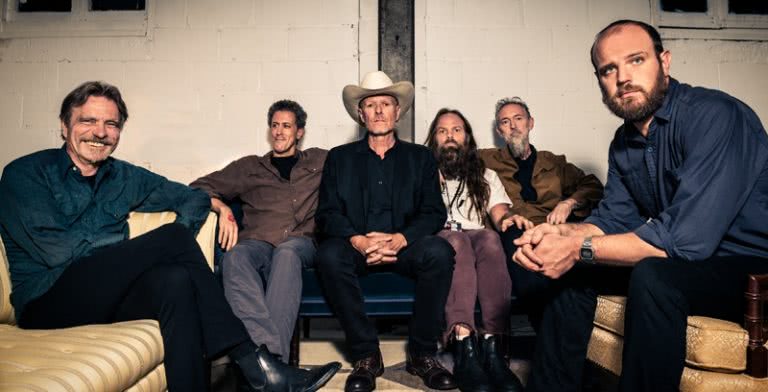You’re unlikely to find a comprehensive list of last year’s finest releases that doesn’t include Swans’ 13th LP,To Be Kind. Despite being widely adored, the third Swans album since the band’s 2010 career reboot is by no means an ingratiating listen.To Be Kindruns for more than two hours, encompassing violent instrumentation, muscular grooves and the odd retreat into disquieting choral beauty.
The critical fervour directed at Swans in recent years is matched by an unheralded amount of listener interest. While the art rockers’ formidable recorded output warrants the prevailing honeymoon period, it’s hardly what bandleader Michael Gira anticipated when he decided to put the band back together after a 13-year hiatus.
“There’s an alarming amount of people at our shows and they seem to be getting something genuine from the music,” he says. “I talk to fans after the show and it’s really touching to see that people really get something from the music – something powerful. That’s why I’m doing it, for myself and for them. The fact there’s more of them is a bonus.”
To Be Kind came two years after the similarly gargantuan LP The Seer. This is an impressive turnover by anyone’s standards, but To Be Kind wasn’t even the first thing Swans released after The Seer. Rather, the majority of tracks on To Be Kind appeared on the 2013 live album Not Here / Not Now. With this in mind, when Swans make their way back to Australia later this week, don’t expect an album recount.
“The set that we’re playing right now live is 80 per cent unrecorded material that’s still finding itself,” Gira says. “The goal is to keep things immediate and as intense as possible onstage and not just be up there by rote going through the material.”
For decades, Bob Dylan has been dividing audiences all over the world by performing versions of his songs that scarcely resemble the original recordings. Similar to Dylan, Gira’s decision to diverge from the album material onstage isn’t motivated by stubbornness or misanthropic satisfaction. Rather, he’s hell-bent on the live show being a creative and viscerally gripping experience.
“The main thing is we’re trying to make something urgent and undeniable happen in the moment,” he says. “I’ve always hated the records as soon as they’re done. Not actively – I don’t try to kill them or anything – but after a couple of weeks it just sounds like a caricature or something that’s dead. So much has been put into it that it’s impossible to see it clearly anymore.
“Over the years I’ve realised that to me the really important thing is being in the process. Of course, the final work is important too, but to me what really matters is being tasked to the utmost and trying to make the maximum I’m capable of as a human being.”
Along with fortifying the sensation Swans conjure onstage, the band’s primal, progressive approach to performance has revolutionised how material gets written. “We went out and just played the songs from My Father Will Guide Me Up A Rope To The Sky, as well as just a couple of old Swans songs,” Gira says. “After doing several shows it wasn’t cutting it, so we started mutating the material and improvising and changing it to something else. Gradually, through that process, a whole bunch of new material started to develop.
“It’s not individual players improvising in a way that jazz people might,” he adds. “It’s more like finding ways inside the sound to make it find a new path, or to follow the path in a different way. I think it’s kind of unique, what we do, in that way. The music’s utterly transporting when it’s at its best.”
Taking into account the two-hour commitment demanded by Swans records, and their expectation-thwarting live shows, the New Yorkers sit in direct opposition to contemporary culture’s emphasis on snippets and predictability. In a career that dates back to the early ’80s, Gira has always been a uniquely uncompromising artist. He’s dealt with plenty of denigrating scrutiny – “In the early days of Swans’ career the response was pretty much negative or scathing,” he says – but that hasn’t impeded his questing aesthetic.
“What is the alternative – to sit around and eat veggie burgers all day?” he laughs. “What you do with your short time on Earth is incredibly important, so you better make something of your life. I don’t mean, ‘Achieve, get famous, get rich.’ That stuff means nothing. But it’s your duty as a human being to make something that matters to you and the community around you.”
Speaking of community, the band’s steadfast irreverence hasn’t alienated its fan base. “It just goes to show you that there are people on Earth who are not internet zombies,” Gira says. “There’s a lot of people that want something true. There’s a lot of people that want something that’s challenging and real – they want the sweat, or they want the reality of things.”
It’s easy to picture Gira as an aesthetic ascetic – a man who suffers for his art. His unflagging productivity and firm dismissal of complacency belies the fact he’ll soon turn 61 years old. In spite of his astonishing willpower, he still manages to have fun, in a roundabout way.
“For me, fun is work,” he says. “Fun is just work that you love. And having sex too, I suppose.”
To Be Kindout now throughMute/Create Control. Catch them alongside Oren Ambarchi atManning BaronThursday January 22, ticketsonline.


































